The dogs that smell breath to monitor diabetes
- Published
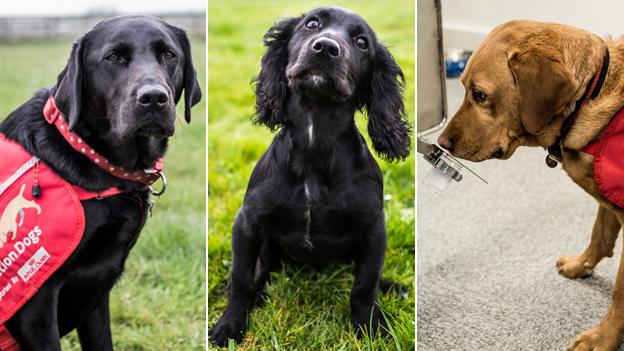
Guide dogs stop you bumping into things, assistance dogs can pull your clothes out of the washing machine. But medical detection dogs can keep you alive.
These dogs have been specially trained to smell several cancer types. Others can gauge the blood sugar levels in diabetics, warn allergic owners away from peanuts, or detect when people with narcolepsy are about to fall asleep.
Their sense of smell is so strong that they can smell their owner's breath from another room of the house, and can even be on guard from the side of a football pitch or dance floor.
"I used to stay awake, or wake up every hour overnight, testing my blood sugars 20 times a day," says Claire Moon, who has type 1 diabetes. She used to fear not waking up in the morning because her body has stopped giving warning signs - such as dizziness or blurred vision - when her blood sugar dips dangerously low.
It's a condition referred to as "brittle", and it means that she does not know when she needs to eat something sugary to correct the situation - known as a "hypo". It means she's been constantly under threat of a loss of reasoning and maybe experiencing a seizure or a rapid fall into a diabetic coma. Her quality of life was very poor as a result, she says.
But then seven months ago, Moon, a paediatrician from Buckinghamshire, received a medical detection dog. When Magic smells his owner's breath, he knows when her glucose levels go below 4.5 on the scale, and he alerts his new owner by nudging, licking or bringing her diabetes testing kit.
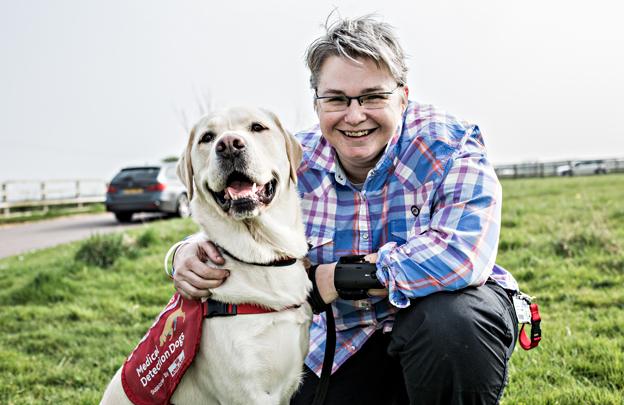
Magic with his owner Claire Moon, who has "brittle" diabetes
Moon then tests her blood and, if he's right, has to reward the dog before she takes the sugar she needs.
"He links the alerting behaviour to a reward," says Moon. "He gets a little special treat, a bacon and cheese thing, so he knows that smell and that action he's just done is right, and he'll remember it for next time."
Dr Claire Guest, chief executive and director of operations at the charity Medical Detection Dogs, says that hypos can make people appear drunk, before they collapse, "and then they'll go into a coma and you've got to try and get the sugar in their mouths."
In the short time she has had Magic, he has already alerted Moon a remarkable 800 times that she is going into hypo. "If I hadn't detected them, it could have left me at risk of dying," she says. Often the first time people with brittle diabetes know their levels are too low is upon waking up in hospital.
Of the 50 medical detection dogs in the field, the majority are diabetes dogs. But the origins of the charity, which go back to a 2004 research study, were in cancer research.
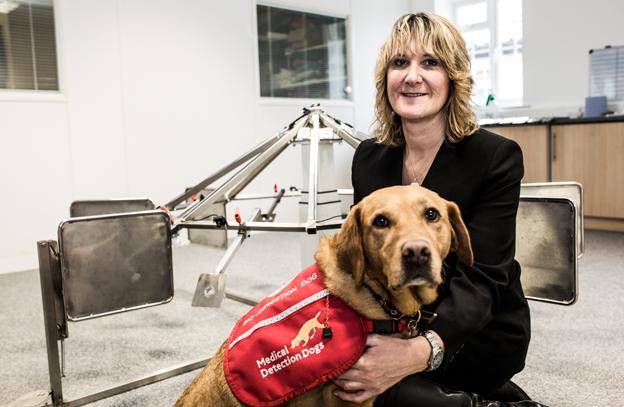
Dr Claire Guest established the Medical Detection Dogs charity in 2008
"There was obviously huge interest around the world," says Guest, of the study's results. Having previously worked with hearing dogs for deaf people, Guest had realised she may be able to harness a dog's superior smelling powers on a more individual basis.
"I had a belief, a vision I suppose, that there were probably other medical conditions that dogs may be able to train to assist with and therefore become assistance dogs."
The dogs, who wear red and gold coats to distinguish themselves as service animals, are trained at the charity's headquarters near Milton Keynes and help their owners in diverse ways.
Karen Ruddlesden from Dorset has the world's only known cortisol detection dog, picking up on low levels of cortisol - a symptom of Addison's disease. Sometimes called the "fight or flight" hormone, cortisol helps your body deal with stress - like a loud bang, or if you have a cough or cold. But Ruddlesden had her adrenal glands removed 10 years ago and now cannot produce cortisol naturally.
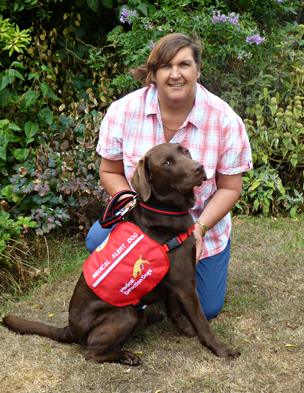
Coco warns her when her levels drop with very hard licks - different to his "loving licks" - so she can take her medication in good time. Without this prompt she could fall into a coma or worse.
Before Coco arrived in 2010, Ruddlesden had been too frightened to leave her house. Since, she has travelled across the US and Europe.
Even Ruddlesden's doctor has found use for the dog's talents. Coco's presence was recently requested in hospital when Ruddlesden underwent an endoscopy examination, in which, unlike most patients, she had to be sedated to avoid stress.
"They did the procedure and then wheeled me out to where Coco was," Ruddlesden says. "He put his feet on the trolley where he sniffed me, then looked at my partner who told the staff I was OK.
"Standard cortisol tests can take up to an hour," she explains, "whereas Coco is instant."
The charity's dogs work in homes and laboratories. Domestically, they pick up crisis clues from their owner's breath, while breath and urine samples are used when their cancer research dogs are doing lab work.
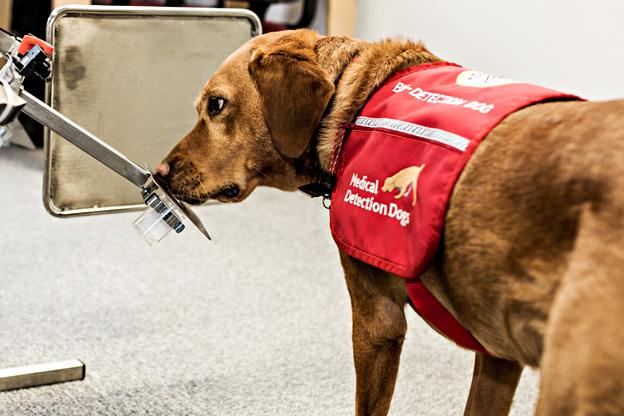
Medical alert dogs can be trained to detect a number of different cancers
But Guest herself benefited from a somewhat less scientific dog diagnosis. She was working with Daisy, a dog trained to detect bladder cancer, renal cancer and prostate cancer, when Daisy unexpectedly gave Guest a clue which ultimately led to her being diagnosed with breast cancer.
One day, after working hard in the lab, she opened the back of her car to let all her dogs out for a run - but Daisy didn't go with them.
"She just kept jumping in my face and seemed quite anxious, and wouldn't jump out to run round. She bumped into me and I felt a sore area, like a bruised area." Guest went to her doctor and later discovered she had a deep-seated breast cancer. After surgery and lymph node removal, she was in the clear. "Without question my prognosis would've been very different had Daisy not warned me," says Guest.
Despite her personal experience of breast cancer, Guest is particularly keen to have the opportunity to test whether the dogs can detect pancreatic cancer - a cancer which has a particularly poor survival rate and not as much popular support.
"There have been hundreds and hundreds and millions of pounds spent on cancer detection by big institutes and there has been no headway whatsoever made on the diagnosis of pancreatic cancer," she says. "I reckon a dog could detect that on breath samples."
Follow @BBCOuch, external on Twitter and on Facebook, external, and listen to our monthly talk show